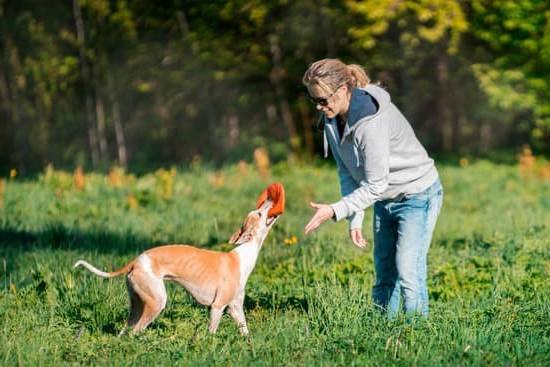What it takes to be a service dog trainer involves a deep understanding of the role and importance of these professionals in society. Service dog trainers play a crucial role in improving the lives of individuals with disabilities by training dogs to assist them in their daily activities. From providing companionship to helping with specific tasks, these trained dogs are invaluable to those they serve.
Becoming a successful service dog trainer requires more than just a love for animals. It involves obtaining the right qualifications and education, honing the necessary skills and characteristics, understanding different disabilities, and adhering to ethical considerations. This article will delve into the various aspects of what it takes to be a service dog trainer, offering valuable insights for those considering this rewarding career path.
From navigating the training process to career opportunities available in this field, aspiring service dog trainers can gain an understanding of the level of commitment and dedication required for success. Moreover, recognizing the significant impact they can make on the lives of individuals with disabilities offers a compelling reason for individuals to pursue this profession.
Qualifications and Education
To become a service dog trainer, individuals need to have the right qualifications and education that will equip them with the necessary skills and knowledge for this important role. While there is no specific degree required to become a service dog trainer, having a background in animal behavior, psychology, or veterinary medicine can be beneficial.
Additionally, obtaining certifications from reputable organizations such as the Certification Council for Professional Dog Trainers (CCPDT) or the International Association of Assistance Dog Partners (IAADP) can demonstrate a trainer’s competency and dedication to the field.
In terms of educational background, many successful service dog trainers have pursued courses or degrees related to animal behavior and training. These programs often cover topics such as learning theory, ethology, canine communication, and obedience training. Some individuals may also choose to specialize in service dog training by pursuing additional coursework or certifications specifically focused on working with assistance dogs.
Furthermore, gaining hands-on experience through internships or apprenticeships with established service dog training organizations can provide invaluable practical knowledge. Working alongside experienced trainers allows aspiring professionals to understand the intricacies of developing and implementing training programs tailored to meet the unique needs of individuals with disabilities. This practical experience complements theoretical knowledge and helps aspiring trainers develop the skills necessary to excel in this rewarding yet challenging career.
| Qualifications | Educational Background |
|---|---|
| Certifications from CCPDT or IAADP | Degree related to animal behavior and training |
| Hands-on experience through internships or apprenticeships | Specialized coursework in service dog training |
Skills and Characteristics
Service dog trainers play a crucial role in improving the lives of individuals with disabilities by training and providing assistance dogs to those in need. To excel in this profession, one needs a unique set of skills and personal characteristics that enable them to effectively train and work with both dogs and their future handlers.
Here are some of the necessary skills and personal traits that make a successful service dog trainer:
1. Patience: Training service dogs can be a lengthy process that requires patience and perseverance. Trainers must be able to remain calm and patient, even when faced with challenges or setbacks during the training process.
2. Communication: Effective communication skills are essential for service dog trainers, as they need to clearly convey commands to the dogs and provide guidance to their future handlers. Additionally, trainers may also need to communicate with other professionals, such as healthcare providers or social workers, who are involved in the care of the individual with disabilities.
3. Empathy: A successful service dog trainer should possess empathy towards both the dogs they are training and the individuals with disabilities who will benefit from their assistance. Understanding the unique needs and challenges of both parties is crucial in providing effective training and support.
4. Adaptability: Service dog trainers must be adaptable and resourceful, as each dog and individual with disabilities has their own unique strengths and limitations. Being able to tailor training methods to suit each specific situation is vital for success.
5. Knowledge of Canine Behavior: A deep understanding of canine behavior, learning theory, and positive reinforcement techniques is essential for service dog trainers. This knowledge allows them to effectively train dogs while considering their well-being.
In addition to these skills and characteristics, aspiring service dog trainers should also pursue relevant education and certifications to ensure they are well-equipped for this important role in society. Understanding what it takes to be a service dog trainer is crucial for anyone considering this career path. With dedication, expertise, compassion, empathy, resolve, patience you can succeed as a responsible Service Dog Trainer.
Training Process
Training a service dog is a complex and demanding process that requires patience, dedication, and a deep understanding of canine behavior. The first step in training a service dog is to establish a foundation of basic obedience skills. This includes teaching the dog to respond to commands such as sit, stay, come, and heel. It is essential for service dogs to have a strong grasp of these fundamental behaviors before moving on to more specialized tasks.
Once the service dog has mastered basic obedience, the next phase of training involves teaching them specific tasks that are tailored to the needs of their future handler. For example, if the service dog is being trained to assist an individual with mobility issues, they may need to learn how to retrieve items, open doors, or provide physical support.
On the other hand, if the dog will be working with someone who has a medical condition such as diabetes or epilepsy, they may need to learn how to recognize and respond to specific symptoms.
In addition to specialized task training, service dogs also undergo socialization and desensitization exercises to ensure they are comfortable and well-behaved in various environments. This includes exposure to different people, animals, sounds, and distractions. Additionally; ongoing health care and grooming will play an important role in keeping these special animals healthy.
| Service Dog Training Step | Description |
|---|---|
| Basic Obedience Skills | Teaching foundational commands such as sit, stay, come, and heel. |
| Specialized Task Training | Teaching specific tasks tailored to the needs of the individual with disabilities. |
| Socialization and Desensitization | Exposing dogs to different environments and stimuli to ensure they are well-behaved in various situations. |
It takes time and commitment from both the trainer and the dog alike for successful service animal training. Meeting requirements involves not just knowing how it’s done but it’s also about practical experience where trainees should spend hours working under an experienced professional trainer while learning alongside them in order for trainees no what it takes taking into account that every animal is unique.
Understanding Different Disabilities
When it comes to training service dogs, it is crucial for trainers to have a deep understanding of the various disabilities that their future handlers may have. By being knowledgeable about different types of disabilities, service dog trainers are better able to tailor their training methods and the tasks that the dogs will be performing to meet the specific needs of individuals with disabilities. Here are some key points to consider when understanding different disabilities:
- Physical Disabilities: Individuals with physical disabilities may require assistance with tasks such as retrieving items, opening doors, or providing stability and balance support. Service dog trainers need to be familiar with these tasks and how they can train dogs to perform them effectively.
- Visual Impairments: For individuals who are visually impaired or blind, service dogs serve as guides, helping them navigate their surroundings safely. Trainers must understand how to teach dogs to guide their handlers through obstacle avoidance techniques and how to effectively communicate directional commands.
- Autism Spectrum Disorders: Individuals on the autism spectrum may benefit from having a service dog that provides emotional support, aids in social interaction, and assists with tasks that help regulate sensory issues. It is important for trainers to have knowledge of these specific needs and how they can train dogs to address them.
By recognizing the unique requirements of individuals with different disabilities, service dog trainers can play a critical role in enhancing the independence and quality of life for those they serve, promoting inclusion and accessibility in society.
In addition, staying abreast of developments in assistive technology and adaptive equipment can also benefit service dog trainers in catering their training programs toward new opportunities for improving the lives of individuals with disabilities. As a result, being adaptable and continuously learning about advancements in tools and devices for adaptive living is essential for anyone interested in becoming a successful service dog trainer.
Ethical Considerations
Respecting the Well-Being of the Dogs
One of the most important ethical considerations in service dog training is ensuring the well-being and welfare of the dogs being trained. It is essential for service dog trainers to prioritize the physical and emotional health of their canine companions throughout the training process.
This includes providing proper nutrition, regular exercise, and mental stimulation to ensure that the dogs are happy and healthy while they are preparing for their future roles as service animals. Additionally, trainers should be mindful of any signs of stress or discomfort in their dogs and take appropriate measures to address these issues.
Meeting the Needs of Future Handlers
Another ethical responsibility that service dog trainers must uphold is meeting the specific needs of individuals with disabilities who will ultimately benefit from their trained dogs. This involves understanding the unique requirements and challenges faced by individuals with different disabilities, such as mobility impairments, visual or hearing impairments, psychiatric conditions, or medical alert needs.
Trainers must tailor their training methods to meet these diverse needs and ensure that each service dog is equipped with the skills necessary to assist their future handler effectively.
Striking a Balance
Finding a balance between respecting the well-being of the dogs and meeting the needs of their future handlers can be a challenging ethical dilemma for service dog trainers. It requires careful consideration and decision-making to ensure that both the dogs and their future handlers are given equal importance throughout the training process.
Trainers must constantly evaluate their methods and make adjustments as needed to uphold these ethical responsibilities while working towards producing highly skilled and dedicated service animals. This delicate balance is crucial in creating successful partnerships between service dogs and their handlers, ultimately improving the quality of life for individuals with disabilities.
Career Opportunities
Service dog trainers have a multitude of career opportunities available to them once they have completed their training and gained the necessary certifications. Whether they choose to work for an organization or start their own business, the demand for skilled service dog trainers continues to grow as more individuals with disabilities seek the assistance and companionship of these specially trained animals.
Working With Organizations
Many service dog trainers find fulfilling careers by working with reputable organizations that train and place service dogs with individuals in need. These organizations may focus on a specific type of disability, such as visual impairments or mobility limitations, or provide a range of services to clients with various needs. Trainers employed by these organizations often work closely with clients to assess their needs, match them with suitable dogs, and provide ongoing training and support.
Starting a Training Business
For those who are entrepreneurial-minded, starting their own service dog training business can be a rewarding career path. This allows trainers to have more control over their schedule, clientele, and training methods. Building a reputation for excellent service and successful placements can lead to a thriving business that has a positive impact on the lives of both the individuals receiving the service dogs and the trainers themselves.
Consulting and Education
Some experienced service dog trainers may also pursue opportunities in consulting or education within the field. They can share their expertise by providing workshops, seminars, and online courses for aspiring service dog trainers or professionals working in related fields. Additionally, they may offer consulting services to organizations looking to improve their existing training programs or expand into new areas of service dog training.
Aspiring service dog trainers should carefully consider their career goals and preferences when deciding which path to pursue. Each option offers its own set of challenges and rewards, but all have the potential to make a meaningful impact on the lives of individuals with disabilities.
Conclusion
In conclusion, becoming a service dog trainer is a demanding yet deeply rewarding career path. It requires a combination of education, skills, and personal characteristics that enable individuals to work closely with these incredible animals and make a positive impact on the lives of people with disabilities.
The qualifications and certifications needed to enter this field are essential for ensuring that trainers have the knowledge and expertise to provide proper care and training for service dogs. Additionally, possessing the necessary skills and personal traits such as patience, empathy, and determination is crucial in effectively training these dogs to assist individuals with diverse needs.
The training process for service dogs involves a step-by-step approach, from basic obedience commands to specialized tasks that cater to the specific needs of their future handlers. Understanding different disabilities is also vital when training service dogs, as it allows trainers to tailor their methods and techniques accordingly. Moreover, ethical considerations play a significant role in this profession, as respecting the well-being of the dogs and the needs of their future handlers is paramount.
Aspiring service dog trainers should take note of the various career opportunities available in this field, whether it be working with different organizations or starting their own training business. By embracing this career, individuals can truly make a difference in the lives of people with disabilities. Ultimately, what it takes to be a service dog trainer goes beyond just technical knowledge-it requires genuine dedication and passion for improving the quality of life for both humans and animals alike.
Frequently Asked Questions
How Do I Become a Certified Dog Trainer in Texas?
To become a certified dog trainer in Texas, you can start by gaining experience working with dogs and completing a professional dog training program. Once you have the necessary experience and education, you can pursue certification through organizations like the Certification Council for Professional Dog Trainers (CCPDT) or the International Association of Canine Professionals (IACP).
How Do I Become a Service Dog Trainer in Ontario?
Becoming a service dog trainer in Ontario typically involves gaining experience in dog training and then specializing in service dog training. Look for programs or courses specifically focused on training service dogs, and consider getting certified through organizations like the International Association of Assistance Dog Partners (IAADP) or Assistance Dogs International (ADI).
How Do I Become a Service Dog Trainer UK?
In the UK, becoming a service dog trainer usually starts with gaining experience in general dog training and then moving into specialized service dog training. Look for courses or apprenticeships that focus on service dog training, and consider obtaining certification from organizations such as the Institute of Modern Dog Trainers (IMDT) or the Association of Pet Dog Trainers (APDT).
Keep in mind that specific requirements may vary depending on the organization offering certification.

Welcome to the blog! I am a professional dog trainer and have been working with dogs for many years. In this blog, I will be discussing various topics related to dog training, including tips, tricks, and advice. I hope you find this information helpful and informative. Thanks for reading!





